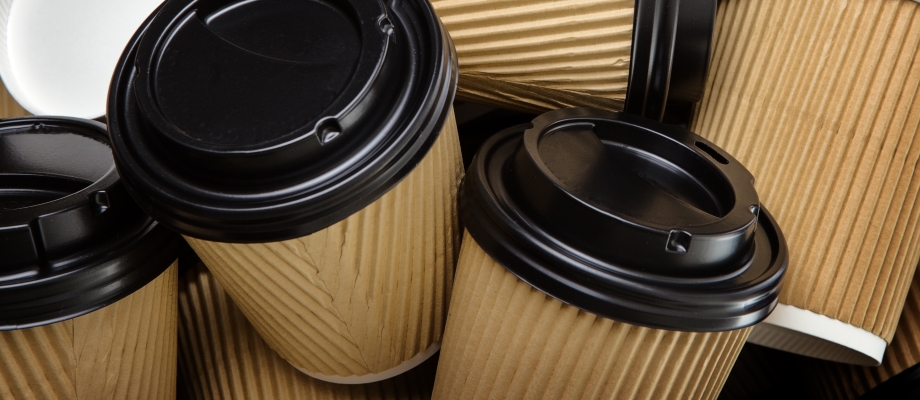
WasteNott campaign: first progress report
December 6th, 2018
At the start of the September 2018 academic session we launched #WasteNott — a campaign to reduce the amount of single-use plastic being thrown away at the University of Nottingham. With your help we’ve seen some great early progress — but there’s still much to be done.
The aim of WasteNott is to encourage and support the reduction of single-use plastic waste across our UK campuses. In its first phase, the campaign focuses on the following areas identified in the recent Plastic Challenge Survey: single-use hot drink cups, plastic bottles, straws and plastic cutlery.
While the initial stage of the campaign focuses on the four selected areas, we have continued to receive suggestions of other ways we can make changes. Thankyou to everyone who has contributed ideas. Responses to a number of questions have been published on the campaign FAQs page.
Though WasteNott is still in its early stages, we can report some developments to date. Firstly, plastic straws have been removed from the front of house in all University-run catering outlets. Bendy plastic straws are still available on request should they be needed.
Secondly, we have seen an increased use of reusable hot drink cups around the University since the start of session, supported by the implementation of a levy and discount system on disposable and reusable cups respectively. This system has been implemented at campus cafés, Students’ Union outlets and Sodexo-managed cafés.
As of mid-November 2018:
- The use of reusable cups has saved more than 10,500 disposable cups being thrown away
- At campus cafés, 14% of drinks have been served in reusable cups compared to 72% in disposable cups
- More than 900 UoN KeepCups have been purchased on campus
These figures provide a solid start yet they also show that we still have a long way to go. While reusable cup use has increased over the term, so too has disposable cup use. We want to change this: our aim is to reduce the amount of single-use hot drink cups used on our UK campuses by 50% by August 2020. Find out more about our targets.
To support this goal we will continue to promote reusable drink cups, with UoN-branded KeepCups available for sale at catering outlets across campus.
Alongside our focus on hot drink cup waste, we are encouraging a 30% reduction in plastic bottle waste. To support this we have committed to installing more water coolers in accessible spaces around our campuses. These installations have been supported by the Environment Initiative Fund. Further details are currently being finalised and locations will include the Teaching and Learning Building, the Portland Building, the Medical School, Engineering Science Learning Centre (ESLC) and The Barn.
Speaking about the results of the WasteNott campaign so far, Andrew Nolan, Director of Sustainability at the University of Nottingham, said:
“I am delighted to see some positive change early in the campaign — and I know that there is much higher awareness of the issues around single-use plastics. Well done to those of you who’ve made changes to your purchasing decisions — you’re doing great things. I hope more people will follow your lead.”
Thank you to everybody who has supported the WasteNott campaign so far by asking for refills, choosing to reuse and joining the conversation in person and online.
To keep an eye on all the latest news and updates, visit the campaign website — and don’t forget to tag us in your campaign pictures on social media using the hashtag #wastenott.
The WasteNott targets:
- Reuse: Use reusable drink cups and help us achieve a 50% reduction in hot drink cup waste by August 2020
- Refill: Use refillable bottles and help us reduce plastic bottle waste by 30% by August 2020
- Refuse: Say no to unnecessary single-use plastic
Tags: recycling, Refill, Reuse, Single use plastic, sustainability, waste, WasteNott
One Comment
Other

Need news? See you on SharePoint
After 14 years of service, Campus News is being retired as the university’s staff news platform. […]

Roads and car parks closed for refurbishing work
As part of ongoing road improvements at the university, works will be taking place to resurface […]


December 10th, 2018 at 8:21 am
Michael Symonds
The targets for this need to be increased dramatically if they are to have a real impact. A 50% reduction will still leave ~0.5m drink cups being disposed of. All the plastics in this campaign were hardly ever used 20 or 30 years ago. We coped very well without them then and could easily do so now. A 100% reduction should be the target and this in line with the numerous reports following on from the UN report on climate change/breakdown. It is only by “tripling” any initiatives to reduce carbon/plastic etc use that any real impact can be made. We clearly owe this to all future generations who will suffer from our profligate use of “disposable” items.